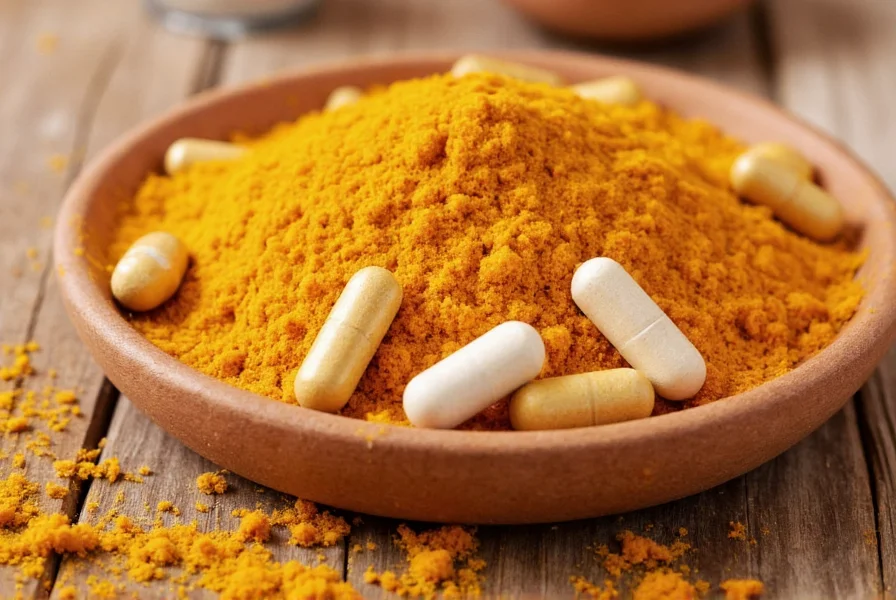Turmeric, particularly its active compound curcumin, can dangerously interact with several medications. Key medications to avoid combining with turmeric include blood thinners (warfarin, aspirin, clopidogrel), diabetes medications (insulin, metformin), blood pressure drugs, anti-inflammatory NSAIDs, chemotherapy agents, and iron supplements. These interactions can increase bleeding risk, cause hypoglycemia, or reduce medication effectiveness. Always consult your healthcare provider before combining turmeric supplements with prescription medications.
Turmeric has gained widespread popularity for its potential health benefits, but many people don't realize it can interact dangerously with common medications. As a natural blood thinner and metabolism influencer, turmeric's active compound curcumin affects how your body processes certain drugs. Understanding these interactions is crucial for maintaining your health and safety, especially if you're managing chronic conditions with prescription medications. This comprehensive guide details exactly which medications pose risks when combined with turmeric supplements or high dietary intake.
Why Turmeric Interacts with Medications
Turmeric contains curcumin, which affects multiple metabolic pathways in your body. It inhibits certain liver enzymes (particularly CYP3A4 and CYP2C9) responsible for breaking down medications, potentially increasing drug concentrations in your bloodstream. Additionally, turmeric has natural anticoagulant properties that can amplify the effects of blood-thinning medications. These mechanisms explain why what medicines should not be taken with turmeric is such an important question for millions of supplement users.
Medications That Interact Dangerously with Turmeric
1. Blood Thinners and Anticoagulants
This represents the most dangerous category of medications that interact with turmeric curcumin. Turmeric naturally slows blood clotting, which can dangerously amplify the effects of:
- Warfarin (Coumadin)
- Aspirin
- Clopidogrel (Plavix)
- Dabigatran (Pradaxa)
- Rivaroxaban (Xarelto)
Combining turmeric with these medications significantly increases bleeding risk, potentially leading to bruising, nosebleeds, or internal bleeding. If you're asking can I take turmeric with blood pressure medication, note that some blood pressure medications also have blood-thinning properties that compound this risk.
2. Diabetes Medications
Turmeric may lower blood sugar levels, which can dangerously amplify the effects of diabetes medications, causing hypoglycemia (dangerously low blood sugar). Be particularly cautious with:
- Insulin
- Metformin (Glucophage)
- Sulfonylureas (glyburide, glipizide)
- Thiazolidinediones (pioglitazone)
| Medication Category | Specific Medications | Potential Interaction Effect |
|---|---|---|
| Blood Thinners | Warfarin, Aspirin, Clopidogrel | Increased bleeding risk, bruising, hemorrhage |
| Diabetes Drugs | Insulin, Metformin, Sulfonylureas | Hypoglycemia, dizziness, confusion |
| Blood Pressure Meds | ACE inhibitors, Calcium channel blockers | Excessively low blood pressure |
| NSAIDs | Ibuprofen, Naproxen, Aspirin | Increased stomach bleeding risk |
3. Blood Pressure Medications
Turmeric may lower blood pressure, which can dangerously amplify the effects of antihypertensive medications. When considering can I take turmeric with blood pressure medication, be aware that combining them may cause:
- Dizziness or lightheadedness
- Fainting
- Excessively low blood pressure
This interaction is particularly concerning with ACE inhibitors and calcium channel blockers.
4. Non-Steroidal Anti-Inflammatory Drugs (NSAIDs)
Combining turmeric with NSAIDs like ibuprofen (Advil, Motrin) or naproxen (Aleve) increases the risk of stomach ulcers and gastrointestinal bleeding. Both turmeric and NSAIDs can irritate the stomach lining, creating a compounded risk that many people don't consider when asking what drugs should not be mixed with turmeric.
5. Chemotherapy Drugs
Some evidence suggests turmeric might interfere with certain chemotherapy medications. While research is ongoing, oncologists generally recommend avoiding high-dose turmeric supplements during cancer treatment unless specifically approved by your oncology team. This represents one of the more serious dangerous turmeric drug combinations for cancer patients.
6. Iron Supplements
Turmeric may reduce iron absorption, potentially counteracting the effects of iron supplements. This is particularly important for individuals with iron deficiency anemia who rely on supplementation.
Symptoms of Dangerous Interactions
Watch for these warning signs if you're taking turmeric with medications:
- Unusual bruising or bleeding that won't stop
- Extreme dizziness or fainting
- Confusion, shakiness, or sweating (signs of low blood sugar)
- Severe stomach pain or black/tarry stools
- Excessive fatigue or weakness
Safety Recommendations
To safely use turmeric while taking medications:
- Always disclose all supplements to your healthcare provider
- Never start turmeric supplements without consulting your doctor if you take prescription medications
- Monitor for interaction symptoms regularly
- Consider dietary turmeric (in cooking) as safer than high-dose supplements
- Maintain consistent timing between medications and turmeric intake if approved by your doctor
Remember that turmeric supplement medication warnings are particularly important for older adults who often take multiple medications. The risk of interactions increases with the number of medications you take.
When to Consult Your Healthcare Provider
Consult your doctor before combining turmeric with any medication, especially if you have:
- Bleeding disorders
- Diabetes
- Heart conditions
- Undergoing surgery (stop turmeric at least 2 weeks before)
- Taking multiple medications
FAQs About Turmeric and Medication Interactions
Can I take turmeric with blood pressure medication?
Generally not without medical supervision. Turmeric can lower blood pressure, potentially causing dangerously low readings when combined with blood pressure medications. Always consult your doctor before combining turmeric with blood pressure medication, and monitor your blood pressure closely if approved to use both.
How long after taking medication can I take turmeric?
There's no universal safe timeframe as interactions depend on specific medications and individual metabolism. For most high-risk medications like blood thinners, complete avoidance is recommended. For others, your doctor may suggest spacing doses by 2-4 hours, but never make this decision without professional medical advice.
Does turmeric interfere with birth control pills?
Current evidence suggests turcumin may potentially reduce the effectiveness of hormonal birth control by affecting liver enzymes that metabolize these medications. While research is limited, women relying on birth control should discuss turmeric supplement use with their healthcare provider to avoid unintended pregnancy.
Is it safe to take turmeric with antidepressants?
The safety depends on the specific antidepressant. Turmeric may interact with MAO inhibitors and potentially increase serotonin levels when combined with SSRIs, raising the risk of serotonin syndrome. Always consult your psychiatrist before combining turmeric supplements with any antidepressant medication.











 浙公网安备
33010002000092号
浙公网安备
33010002000092号 浙B2-20120091-4
浙B2-20120091-4